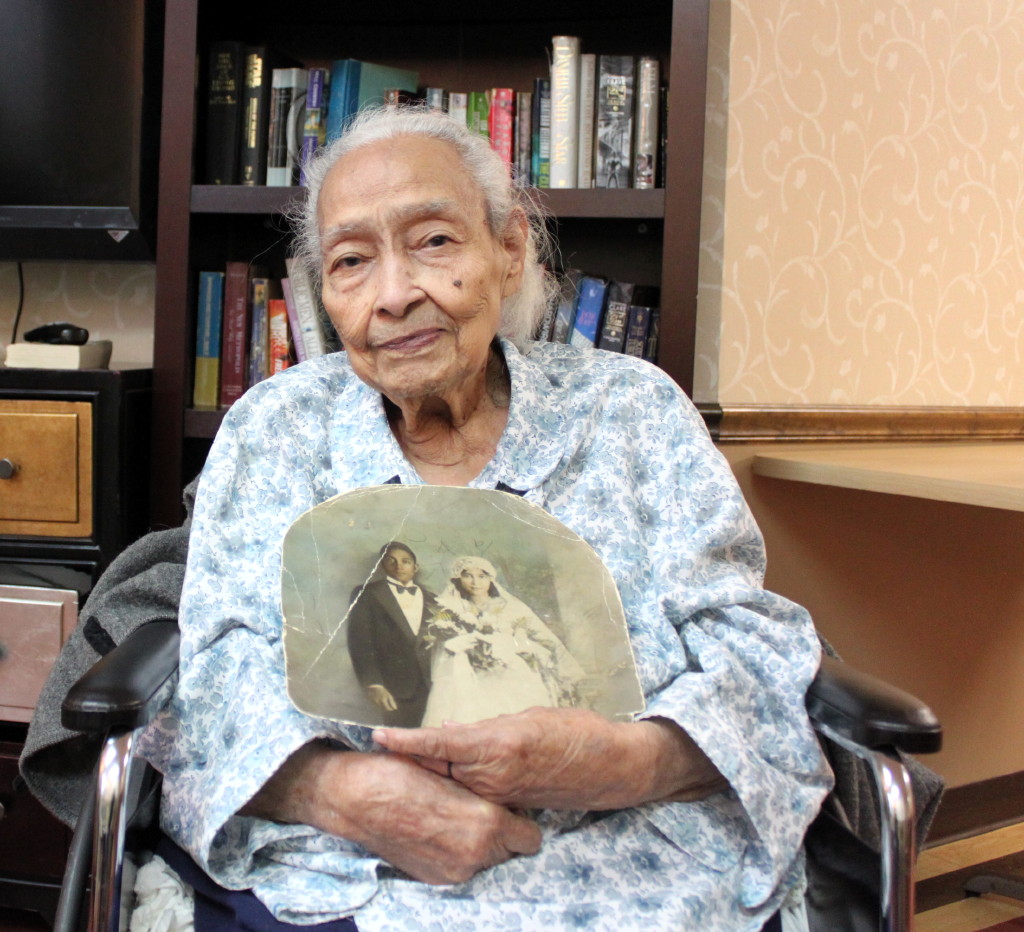Maxie Fletcher, a longtime Princeton resident, died Dec. 14 at the Princeton Care Center on Bunn Drive – two weeks short of her 107th birthday.
Fletcher was born on New Year’s Day 1915 in Graves Station, Georgia, and had lived in Princeton since the 1930s. She was 106 years old.
In an interview with The Princeton Packet a few days after her 105th birthday in 2020, Fletcher recalled that she spent her first nine years on the family farm on Terrell County, which is in southwest Georgia. They had cows and chickens, and they grew their own vegetables.
“I don’t remember going to the grocery store. We had everything we needed on the farm. We lived in a beautiful house. It was nice,” she said in the interview.
Fletcher admitted that as the youngest of nine children, she could often get away without doing her chores on the farm – unlike her older brothers and sisters. On the farm, everyone had to help.
Fletcher’s family, her uncles and their families were sharecroppers, which meant they farmed the land and shared some of what they grew with the man who owned the land.
But life on the farm was hard, and that’s why her father and some of her older brothers and sisters left. They found work in the cities in the North and Midwest. They were part of the “Great Migration” of Blacks from the southern states, who began moving away beginning around 1910.
One of Fletcher’s older brothers worked in a Ford Motor Co. factory in Detroit, Michigan. Her older sister and her husband also worked in factories in Detroit. The sister and her husband moved to Connecticut from Detroit to find work, and then they moved to Trenton. They found work in a factory and later opened their own restaurant.
Her older sister convinced their mother to move north to Trenton with the three youngest children, Fletcher said. They did not own the farm, so there was no reason to stay. Fletcher was nine years old when she moved to Trenton with her mother and sisters.
Fletcher had started school in Georgia, but quit because it was too far from the farm. Her older brothers and sisters taught her to read. When she moved to Trenton, she enrolled in the Trenton public school system.
It was also in Trenton that Fletcher met her future husband, Lorenzo Fletcher. He had been born and raised in Princeton. Like many young men in Princeton, which was a small town in the 1920s and 1930s, he went to Trenton to meet girls.
Fletcher and her soon-to-be husband met through friends.
“The introduction was made. He visited me twice, and he said he wanted to marry me. I told him I was too young, but he convinced my mother and my sister. They liked him,” Fletcher said.
She was 16 years old and he was 21 years old when they married.
The Fletchers lived in Trenton for a short time and then moved back to Princeton. They lived on John Street, and moved several times in the Witherspoon-Jackson neighborhood as their young family grew.
The Witherspoon-Jackson neighborhood was home mostly to Blacks and to the immigrant Italian stone masons who helped to build the expanding Princeton University campus.
There was no need to leave the Witherspoon-Jackson neighborhood because there were grocery stores and “just about anything you needed,” she said. There were barber shops and beauty salons, restaurants and a dry cleaner.
The Fletcher family was active in the First Baptist Church of Princeton on John Street. There wasn’t enough money for movies or other recreation, so “we didn’t go out much,” she said.
While the Italian immigrants worked as stone masons and landscapers, many of the Blacks also worked for Princeton University as janitors, cooks and laborers. The women often found jobs as domestic workers in the homes of Princeton University professors.
“I worked as a cook for quite a few years,” Fletcher said.
Fletcher’s first job was for Professor and Mrs. Hess. She walked to their home on Hodge Road. She said she worked as a cook for various families for about 30 years.
Later, Fletcher worked for a small company that made parts for missiles. She also worked as a cataloger in the rare books section of Princeton University’s Firestone Library.
In their later years, the Fletchers moved to Princeton Community Village, where she continued to live after her husband died in 1988. She subsequently moved to the Princeton Care Center nursing home.
When she was asked during the interview about the secret to her long life and how she navigated through life’s ups and downs, Fletcher paused for a moment.
“I suppose it is the trust in my dear Lord. It is my faith. I guess that’s it,” Fletcher said.
Fletcher’s funeral will be held Dec. 23 at the First Baptist Church of Princeton, on the corner of John Street and Paul Robeson Place. There will be a viewing from noon to 1 p.m., followed immediately by the funeral. Interment will take place in the Princeton Cemetery.
Donations in Fletcher’s memory may be made to a homeless shelter or food bank of the donor’s choice.

